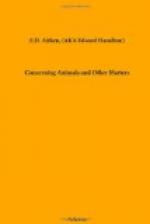And when the poor globe-trotter, who has long since spent more money than he ever meant to spend, and loaded himself with things which he could have got cheaper in London or New York, tries to shake off his tormentors by getting up and leaning over the balcony rails, the shrill voice of the snake-charmer will assail him from below, promising him, in a torrent of sonorous Hindustanee, variegated with pigeon English and illuminated with wild gesticulations, such a superfine tamasha as it never was the fortune of the sahib to witness before.
Tamasha is one of those Indian words, like bundobust, for which there is no equivalent in the English language, and which are at once so comprehensive and so expressive that, when once the use of them has been acquired, they become indispensable, so that they have gained a permanent place in the Anglo-Indian’s vocabulary. It is not slang, but a good word of ancient origin. Hobson-Jobson quotes a curious Latin writer on the Empire of the Grand Mogul, who uses it with a definition appended, “ut spectet Thamasham, id est pugnas elephantorum, leonum, buffalorum et aliarura ferarum.” “Show” comes nearest it in English, but falls far short of it.
The tamasha which the snake-charmer promises the sahib will include serpent dances, a fight between a cobra and a mungoose, the inevitable mango tree, and other tricks of juggling. But to a stranger the snake-charmer himself is a better tamasha than anything he can show. He is indeed a most extraordinary animal. His hair and beard are long and unkempt, his general aspect wild, his clothing a mixture of savagery and the wreckage of civilisation. He wears a turban, of course, and generally a large one; but it is put on without art, just wound about his head anyhow, and hanging lopsidedly over one ear. It and the loose cloth wrapped about the middle of him are as dirty as may be and truly Oriental, though erratic. But, besides these, he wears a jacket of coloured calico, or any other material, with one button fastened, probably on the wrong buttonhole, and under this, if the weather is cold, he may have a shirt seemingly obtained from some Indian representative of Moses & Co.
On his shoulder he carries a long bamboo, from the ends of which hang villainously shabby baskets, some flat and round, occupied by snakes, others large and oblong, filled with apparatus of jugglery. The members of his family, down to an unclothed, precocious imp of ten, accompany him, carrying similar baskets, or capacious wallets, or long, cylindrical drums, on which they play with their fingers. The dramatic effect of the whole is enhanced when one of them allows a huge python, a snake of the Boa constrictor tribe, which kills its prey by crushing it, to wind its hideous, speckled coils round his body.




